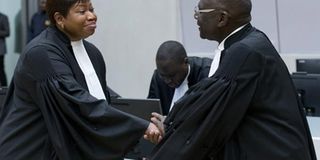Offenders will not escape justice - ICC’s Bensouda

Courtesy. Chief Prosecutor Fatou Bensouda (left) greets a member of the defence team of Dominic Ongwen at the International Criminal Court in the Hague, Netherlands on Tuesday. PHOTO BY AFP
What you need to know:
- Instead, Mr Museveni has since sharpened his criticism of the ICC.
- The court only handles cases referred to it by state parties or the UN Security Council.
THE HAGUE. Burdened by weighty cases and its often polarising indictments, the International Criminal Court’s Chief Prosecutor, Ms Fatou Bensouda, has said diplomatic ping pong by member states and unwillingness to arrest some indictees is “frustrating”.
“It is a bit frustrating I must admit. State parties have those requests and they don’t always do it sometimes, unfortunately, for political reasons,” she said in an interview at her office on Tuesday, noting that some states do not take their responsibility serious as parties to the Rome Statute to arrest wanted suspects.
Framers of the Rome Statute envisaged full cooperation by state parties to execute ICC’s requests, including effecting arrests, and, therefore, decided not to establish a police or separate force to carry through its decisions.
But things have not always worked by plan. For instance, Sudan’s president Omar Bashir is criss-crossing the world --- visiting China, South Africa as well as regional neighbours Kenya and Uganda that are ICC members --- in spite of a long-standing warrant for his arrest on war crimes and crimes against humanity charges in relation to the Darfur conflict.
Nature took care when three of five wanted Lord’s Resistance Army (LRA) commanders died in their lairs, the fourth; Dominic Ongwen surrendered a decade after 2005 indictment and his trial just began at the ICC while the group’s leader Joseph Kony, being pursued by regional militaries supported by US Special Forces, remains at large.
These and other failures have peeled the layer off imperfections, if not fallacy, in ICC’s in-built mechanism -- as a judicial organ with no executing arm --- that evidently delays rather than facilitates quick justice for some of the world’s most grotesque crimes.
Even in favourable instances such as when Uganda, in 2003, was the first country and state party to refer the case of the LRA to the ICC, that enthusiasm has over the years waned and been replaced with contempt for the court seen by many African countries and leaders as an imperial tool the West uses to target them.
President Museveni, for instance, invited his Sudanese counterpart to his May 2016 swearing and not only refused to arrest him on the basis of ICC warrants already deposited in Kampala but openly derided the court as “useless”.
Some diplomats at the inauguration walked out on the Ugandan leader of 30 years in protest, but he did not blink or change his heart.
Instead, Mr Museveni has since sharpened his criticism of the ICC.
However the sabre-rattling notwithstanding, Ms Bensouda said in the Tuesday interview that the government of Uganda is fully cooperating with the Hague-based court, a display of double-faced diplomacy.
Evidence of that cooperation early this week found an expression in ICC’s Trial Chamber IX when prosecution led by Ms Bensouda played high frequency radio communication between LRA commanders, which Ugandan security forces intercepted and made available for the prosecution to build its case of war crimes and crimes against humanity against Ongwen.
“We have received very good cooperation from the government of Uganda until now. Even during the surrender of Dominic Ongwen (in January 2015), and despite the rhetoric, there was cooperation [by Uganda] and it is still there,” Ms Bensouda said.
Other displeased African countries, notably South Africa and Burundi, have each started a formal process to withdraw their ICC membership while Kenya, whose president and deputy president the ICC tried before discontinuing the trial, is mulling taking a similar path.
However, such a withdrawal would under the Rome Statute become effective only one year from the time the instruments of withdrawal are deposited, although ICC would remain at liberty to prosecute or investigate cases in those countries referred to it prior to the withdrawal.
Chief prosecutor Bensouda said: “Joining the ICC, withdrawing from it is a sovereign decision. No state has been forced by anybody to join ICC. But using this withdrawal to escape impunity; it should be clear the jurisdiction of ICC still exists in those states (within a year from deposit of instruments of withdrawal).”
The court only handles cases referred to it by state parties or the UN Security Council.
Allegations that the ICC targets Africans are “erroneous”, said Ms Bensouda, citing preliminary or full-throttle investigations they are carrying out in Georgia, Afghanistan, against UK troops in Syria, in Palestine against Israelis and in Ukraine.
She said they will continue prosecuting accused persons, whether or not they are heads of state or government enjoying immunity at home, as long as there are credible allegations against them filed at the court.
She promised victims of LRA war, mostly in northern Uganda, some hard work by her team to secure conviction of Ongwen as proof of commitment to deliver justice.




